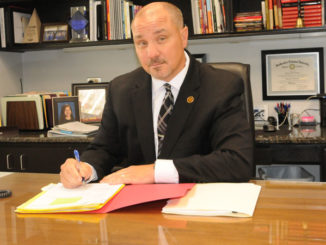
LA Politics notebook by Jeremy Alford and John Maginnis
If you’re looking for signs of life locally out of next year’s battle for the U.S. Senate, then look further north. That’s where Sen. Mary Landrieu, a New Orleans Democrat, and GOP Congressman Bill Cassidy of Baton Rouge, her lead challenger on the 2014 ballot, are plying their trade.
More specifically, they’re trading blows in Washington, D.C., over federal legislation ranging from health care and flood insurance to immigration. Other issues, on which they will surely differ, are expected to soon follow.
Cassidy has a surrogate fighter in junior Sen. David Vitter, a fellow Republican from Metairie. While Landrieu may have the advantage in seniority and committee clout, Vitter is helping the challenger bring his fight into the upper chamber.
When it comes to the cost of flood insurance, Cassidy was able to get the House to pass his amendment to a FEMA funding bill delaying massive rate increases for one year. Vitter, in a letter to the senior senator, has called for Landrieu to use the same language from Cassidy’s provision to amend the homeland security appropriations bill that will go through the subcommittee she chairs.
On immigration, Cassidy and Landrieu appear to be staking out opposing positions on the bipartisan bill that would enable the nation’s 11 million undocumented immigrants to eventually qualify for citizenship if they pay back taxes and fines, learn English and pass criminal background checks.
Politically, supporting the bill could pose more hazards for Landrieu than opposing it would for Cassidy. Only 3 percent of registered voters in Louisiana are Hispanic. What’s more, support for immigration reform is weaker among Landrieu’s base, African-Americans, than among Democrats as a whole.
Donors from opposite sides of spectrum
Donors from outside Louisiana will also help frame the Senate race in the traditional sense of conservative versus liberal. According to reports on file with the Federal Election Commission, Sen. Mary Landrieu’s biggest donor over the course of her career on the Hill is the pro-choice group Emily’s List, with more than $108,000 in donations. One of Rep. Bill Cassidy’s biggest donors for the current cycle, meanwhile, is Koch Industries at $10,000. Koch is a major player in national Republican politics, including the White House.
Major donors in Louisiana may have to pick sides as well, or play both, especially along the coast where Cassidy’s House district was recently expanded. For example, over the course of her career, Landrieu has received $85,000 from Edison Chouest Offshore while Cassidy has received $70,800, making the mega shipyard his largest donor.
Another candidate for Senate?
Taking a lyrical cue from Willie Nelson, Gov. Bobby Jindal is on the road again with a 64-parish tour where he will be signing bills and announcing new projects. Being out amongst voters could help his dropping poll numbers, but it could also serve another purpose — as a litmus test for the developing U.S. Senate race.
“The people of Louisiana shouldn’t have to come to Baton Rouge to see their governor,” he said before making his first stop in Alexandria recently.
Meanwhile, the nation’s political class is wondering what set him off in his “enough already” screed in Politico, a D.C. insiders publication. In a flaming opinion piece, he attempted to energize the GOP by criticizing its “excessive navel gazing,” “feelings of inadequacy” and “panic and apology” approach to politics.
His call to action included colorful platitudes like “get on the offensive,” “kick the other guys around,” “put on your big boy pants” and, above all, “stop the bed wetting.”
The combination of his state tour and literal tour de force only adds fuel to the resurrected speculation that Jindal may yet jump into the Senate race, potentially forcing out Congressman Bill Cassidy.
The resurrection of a former congressmen
Even though no longer in office, Louisiana’s former congressional members are never too far removed. Such is the case with former Congressman Charlie Melancon, a Democrat from Napoleonville who recently sent out an email asking folks to donate money to the re-election campaign of U.S. Sen. Mary Landrieu.
“When I was president of the American Sugar Cane League, I worked closely with Mary on the issues important to our industry,” Melancon wrote. “Mary never wavered in her support of the sugar growers in Louisiana. In farm bills, trade agreements and any legislation affecting agriculture, Mary stood up for Louisiana’s farmers.”
Melancon’s successor, former Congressman Jeff Landry, a Republican from New Iberia who failed to secure his own re-election last cycle, is also out and about in D.C. talking about sugar. He has been advocating an idea on Capitol Hill that involves domestic sugar farmers, like those in Louisiana, abandoning price supports from the federal government.
While that’s exactly what sugar cane boosters fought to avoid in the latest federal farm bill debates, Landry has an important qualifier to his stance. American supports should only be lifted if the sugar industries in competing nations lose their subsidies and tariffs, he said.
It’s called a “zero-for-zero” policy. Supporters, like the America Sugar Alliance, suggest that U.S. trade negotiators should begin by targeting Brazil, which provides nearly $2.5 billion per year in sugar subsidies, helping the country gain a nearly 50 percent market share of global sugar exports.
Nonprofit targets “criminalized journalism”
Media Matters, which bills itself as a “progressive research and information center,” is zeroing in on legislation that Gov. Bobby Jindal signed into law after the spring regular session that makes it criminal for reporters and editors to publish the names of concealed handgun permit holders and applicants.
On its website, the nonprofit has posted quotes from editorial leaders from the New York Times, USA Today and Washington Post, among others, describing the new Louisiana law as “absurd” and a requirement that “media organizations should have to pay a price” for the truth — penalties include six months in jail and a fine of up to $10,000.
The news builds upon the resentment of local media outlets after Jindal refused, at the urging of the Louisiana Press Association this session, to open up more records in his office to public view.
Quotes from the Quorum
“If diversions are the cure for the coast, then I think the medicine is going to kill the patient.”
—Capt. George Ricks, opposing state plans for a large diversion of Mississippi River water and sediment in St. Bernard Parish, in The Advocate
* * *
When syndicated radio host Jim Engster asked Kip Holden who was his favorite musician, the Baton Rouge mayor mentioned Isaac Hayes.
—Engster: “You like ‘Shaft’?”
—Holden: “Oh yeah. I’ve been on the receiving part of that sometimes.”




Be the first to comment